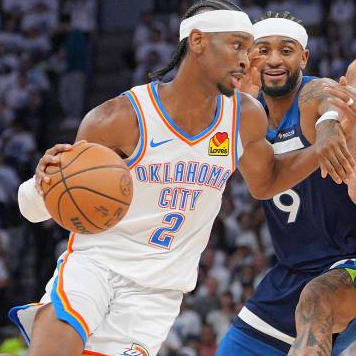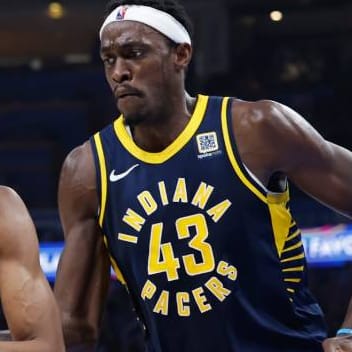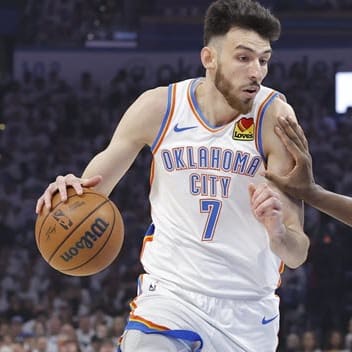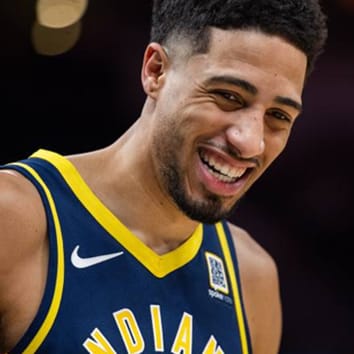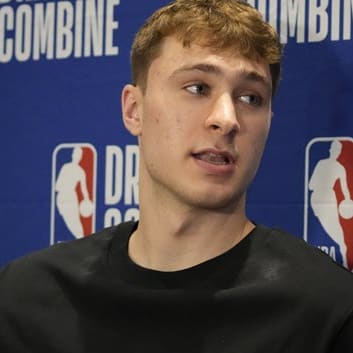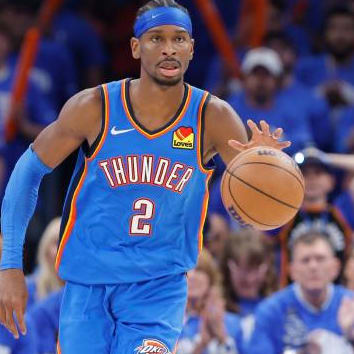This article is part of our The Give and Go series.
The Give and Go
By Charlie Zegers and Carson Cistulli
RotoWire Staff Writers
From: Charlie Zegers
Sent: Monday, February 8, 2010 9:32 PM
To: Carson Cistulli
Subject: Give and Go: Combo Platter
By the time this column is published, Nate Robinson's stint as the Knicks' starting point guard will already be over. I can't say I'm disappointed about the change. As much as I enjoy Robinson the player, some of the decisions he makes with the basketball have been known to cause me physical pain.
Now, that would be a good enough reason not to use him at the point… but there was a secondary reason that's a lot more interesting - to me, at least. Mike D'Antoni thinks Duhon can help the team more as a starter because Duhon can force-feed Danilo Gallinari early in games, which might help get the sweet-shooting but too-passive Gallo to play with a little more aggression.
Will it work? That remains to be seen. But the theory - the "I'm going to play Player X because he makes Player Y more effective" is sound. Some of the combinations are fairly intuitive; think of all the players who looked great running with Steve Nash or Jason Kidd, only to disappoint after signing elsewhere. (Any team looking to acquire Amar'e Stoudemire may want to take note of Shawn Marion's post-Phoenix career.) Other highly productive combinations are a lot less obvious. For example -- Allen Iverson is one of the league's most notorious ball hogs. But for whatever reason, AI makes Sam Dalembert look like an all-star.
Of course, for every combination that's more than the sum of its parts, there are several others that simply don't work well. My favorite example is Andrei Kirilenko - who seems to return to fantasy superstar status whenever Carlos Boozer is out of the lineup. Then there's Andrew Bynum, who still seems to be learning how to play alongside Pau Gasol. Some of this summer's most notable acquisitions may fall into the same category - Andre Miller and Brandon Roy hasn't turned out to be an ideal match, and Hedo Turkoglu and Vince Carter have really struggled to replicate previous seasons' success with this year's teammates.
So… my question to you is this: where do you rank "compatibility with teammates" as a factor in determining a given player's fantasy value? Is it something we can measure in any meaningful way? Or even predict?
From: Carson Cistulli
Sent: Tuesday, February 9, 2010 7:32 AM
To: Charlie Zegers
Subject: Give and Go: Combo Platter
Do certain NBA players benefit inordinately from certain other teammates?
Absotutely.
Is it possible to predict? Hmm, maybe.
Helpful, right?
Let's start with an obvious but important point: teamwork is an actual thing in the NBA. In baseball sometimes, you're watching a game and Tim McCarver or whoever is all, "You know, this team is really benefiting from its excellent chemistry." Or, alternately: "The veteran presence of So-and-So has really brought this team together." Or, anytime Milton Bradley is playing: "That guy's a stone jerk."
Really? Does it matter? Certainly, chemistry in the workplace can make one's job more enjoyable; that's true of working at a coffee shop or in the sales room of a paper company. But the fact remains: baseball is a turn-based game. As such, interaction between teammates -- and the effect of their interaction on wins and losses -- is limited.
Basketball, now that's a different story. Certain players really do seem to make their teammates better. Other players, not so much. Like, if Danilo Gallinari passes to Al Harrington, what are the odds he (i.e. Gallinari) will see the ball again before the end of the possession? It's not zero percent, but it's close.
Conversely, I'm shocked at the developments in Memphis this season. Between Zach Randolph and Rudy Gay -- and O.J. Mayo, to a lesser degree -- how has Marc Gasol received even one pass, let alone put up 14.9 points per game? Not only was that difficult to foresee, but all signs pointed to the exact opposite being true. Having seen Randolph with Portland, New York, and the Clips -- all of them -- I feel comfortable saying there are times when he just turns into a black hole. Once the rock gets to him, he's putting it up.
One thing that might be helpful in this discussion is to look at some data. How about Assist Rate to start with? In the event that our voyeurizing reader doesn't know it, Assist Rate is the percentage of a player's possessions that end in an assist.
Here are the top five Assist Rates in the NBA (among players with 20+ MPG, courtesy of Hoop Data):
- Jason Kidd (47.19)
- Chris Duhon (38.24)
- Rajon Rondo (38.21)
- Steve Nash (37.73)
- Chris Paul (36.34)
Not too many surprises there. Paul, Nash, Rondo, and Kidd are numbers one, two, four, and five, respectively, in assists. Their reputations are pretty well cemented. Duhon, on the other hand, is 13th on the assists per game list. That's more interesting to me: even though he doesn't have the gaudy assist totals of those other guys, he's right there with them (above them, even) in terms of assists per possession. (For reference, Nate Robinson's AR is only 21.52, putting him right above Lou Williams -- and above... Ben Wallace!)
Now here are the worst five (also among players with 20+ MPG):
- Brendan Haywood (3.73)
- Charlie Villanueva (4.30)
- Yi Jianlian (4.58)
- Carl Landry (4.72)
- Amar'e Stoudemire (4.74)
Haywood you can kinda understand, on account of he's fifth in the NBA (among players with 20+ minutes, again) in Offensive Rebound Rate. Probably a lot of his possessions are ended by put-backs. That makes sense. Landry? He's the main point-scorer on the Rockets' second unit. Plus, he gets to the line so often. Amar'e? He shoots. And shoots. And shoots. Yi? Hmm, no explanation there. It might have something to do with the fact that the Nets are horrible. Finally, there's Villanueva. Though this is his lowest AR of the most recent four years (he's usually in the 7-9ish range), it doesn't surprise me to see his name on this list at all. Certainly, it reinforces the reputations he's developed as a chucker.
What do you think? Those numbers make sense to you? Any other guys on that list stick out, either for being good or bad? Is this even a good way to figure out a decent teammate?
From: Charlie Zegers
Sent: Wednesday, February 10, 2010 3:45 PM
To: Carson Cistulli
Subject: Re: Give and Go: Combo Platter
I suspect Duhon's high assist rate is due, in part, to his reluctance to shoot and/or inability to hit a freakin' layup.
Don't mind me, I just watched the Knicks blow a 15-point fourth-quarter lead to the Sacramento Kings. I wouldn't mind as much if Tyreke Evans and Kevin Martin had simply taken over the game - and to some extent, that's what happened. But they were aided and abetted by seriously ugly play from the home team.
It's amazing how bad play snowballs. Duhon would drive into the lane - but because he suddenly can't hit a two-footer (what's the basketball name for Steve Blass disease? I think Duhon caught it over Christmas. Maybe he was hanging out with Chuck Knoblauch) he'd pass out to Al Harrington. Of course, Al would jack up a shot from wherever he happened to be standing. When that clanked off the rim, Jason Thompson would pull it down and hand off to Evans, who would break down the Knicks' defense with his dribble and hit another layup. Then Robinson, seeing the lead shrinking, would attempt to take things into his own hands, driving into the teeth of Sacto's zone for another bad shot… and another King rebound… and another Evans layup.
For a while, I really thought New York could contend for the eighth spot in the East. Looking at them now? They've got two key rotation players who cannot score in Duhon and Jared Jeffries, and two others in Robinson and Harrington who are jacking up shots every time they get a touch. Playoffs? (Read that in a Jim Mora voice) Right now I'm wondering when they'll win another game.
Sorry - had to get that out of my system. Where were we?
I think assist rate is part of the equation in defining "teammate effect." But it's also the most obvious, and to some extent, it's already factored in to fantasy values. If I'm looking for a spot-up shooter that'll have fantasy value, I'm looking for someone on a team that either has an excellent point guard or one that has players who are great at passing out of double-teams - think Shaq in his prime.
But passing isn't the only factor worth considering.
There are a limited number of shots to be had in a game. Players who don't need to be the focus of a lot of plays help their teammates indirectly, creating a larger "pool" of shots for the other guys to split. Look at a guy like Ben Wallace, or Shane Battier, or even my pal Jared Jeffries. Those guys play good defense. They help teams get extra possessions. And most importantly, they defer to the likes of Aaron Brooks and Ben Gordon and David Lee on the offensive end.
From: Carson Cistulli
Sent: Wednesday, February 10, 2010 4:16 AM
To: Charlie Zegers
Subject: Give and Go: Combo Platter
Zegers, have you considered -- I don't know -- maybe getting some serious counseling for this Knicks-related sitch you got going on? Because, I mean, I'm no psychologist, but on account of you just killed off 400 or so words mourning a regular season loss, I'm thinking maybe it's time you sought professional help.
I'm just saying.
In other news, I'm not sure I've informed you of this, but allow me to admit it now: I'm a gigantic nerdbone. My sporting DNA dictates that I try to explain all sporting-related phenomena by means of numbers, more numbers, and still more numbers.
As such, I'm tempted to use some advanced stats to seek out other players who might fit your Shane Battier/Jared Jeffries mold -- that is, players who don't need to be the focus of offense.
The way to do it, so far as I can tell, is to look at Usage Rate. Usage Rate (or USG from now on) is the percentage of a team's possessions that a particular player ends during his time on the floor, either by means of a shot, a turnover, or a trip to the free-throw line. To give you (and the reader) an idea of the usage leaders, why not take a gander at this list (with USG in parentheses):
- Dwyane Wade (35.13)
- Carmelo Anthony (34.15)
- LeBron James (33.84)
- Kobe Bryant (33.03)
- Kevin Durant (32.01)
Those aren't surprising names, which means they're also not particularly interesting names.
The thing I'm more interested in here are the players at the opposite end of the spectrum, the players who, because of their incredible passivity, actually force their teammates to end more possessions than they might otherwise.
To that end, I present the 10 current laggards in Usage Rate (among players with 20+ minutes per game, courtesy of Hoop Data):
- Ben Wallace (9.40)
- Jared Jeffries (10.03)
- Andris Biedrins (10.27)
- Joel Przybilla (10.31)
- Nick Collison (10.95)
- Chris Andersen (10.97)
- Thabo Sefolosha (11.20)
- Keith Bogans (11.27)
- Shane Battier (11.65)
- Anthony Parker (11.69)
This is a more interesting list. First of all, it includes all three of the guys you mention in your most recent email: Wallace, Jeffries, and Battier (first, second, and ninth, respectively). If you're like me, you're more likely to show interest in a stat when it confirms beliefs you already hold.
The more immediate question, I think, is: How does this info help us totally dominate our fantasy leagues?
In certain cases -- as with Anthony Parker, Chris Andersen, Thabo Sefolosha and Nick Collison -- not so much. Those four play alongside LeBron, Carmelo, and Kevin Durant, respectively. Those are three guys we just saw on the highest-usage list. This is very probably a case of a role player simply deferring to a recognized star.
In other instances, though -- as with Wallace, Jeffries, Biedrins, and the injured Przybilla -- we see potentially fruitful relationships. Wallace plays alongside Stuckey and Hamilton and Villanueva (provided any of them are fit). Jeffries plays alongside the aforementioned Harrington and Galliarni. Biedrins -- Biedrins plays along whoever Don Nelson says! Most often, that's some permutation of Monta Ellis, Corey Maggette, and Stephen Curry. And as for 'billa? Well, he's injured. But between his low USG and his high offensive rebound rate, he's an ideal fantasy teammate when healthy.
Or so say the stats! Maybe you're not sold, Zegers. In any event, give it to me straight, Zegers: do you think that USG can be of assistance when attempting to identify the ideal fantasy teammate? Or do you think it's a load of hooey?
From: Carson Cistulli
Sent: Thursday, February 11, 2010 8:05 AM
To: Charlie Zegers
Subject: Re: Give and Go: Combo Platter
There's no help for Knicks fans. There is only 2010. You'd think the Isiah years would have killed any affection for the franchise… but I'm a die-hard. I have a Clyde Frazier throwback jersey in my bottom drawer, and I still get my car washed at Oakley's.
I think you're on to something with those usage rate numbers - beyond Wallace/Jeffries/Battier/Przybilla. Sefolosha is a defensive specialist - he continues to get playing time over James Harden primarily because he's good at harassing the opposition's best wing players. Andersen and Biedrins are shot-blockers and rebounders - again, not guys who are going to demand a lot of shots; they make a living on put-backs.
Do they have low usage rates because they're playing alongside elite scorers? Maybe. But maybe it's fair to suggest that guys like Durant and Anthony are more successful because they're playing alongside guys like Andersen and Sefolosha.
Article first appeared on 2/11/10






